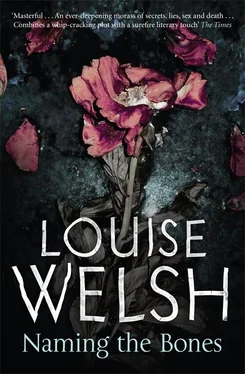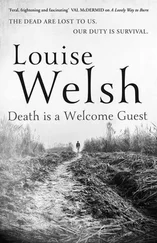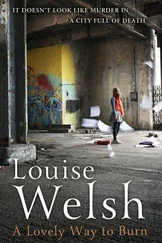‘Strange how you call him by his first name, as if you know him.’
‘I don’t feel I know him at all.’
‘But you’re in love with him?’
She arched her eyebrows. It was an old-fashioned style he’d encountered in some female academics of her generation, a need to provoke, as if years of being overlooked had left their mark.
‘I’m in love with his poems.’
‘What would your ultimate prize be?’
Murray looked at his feet.
‘To discover a new work, even one new poem.’
Christie smiled. ‘Of course.’ She leaned back in her chair and stared out into the darkness. ‘I think it’s only fair to tell you that I’ve written an account of my time with Archie. It will only be published, even in extract form, after my death. I should also tell you that as far as I’m concerned it’s the only statement I’m prepared to make on Archibald Lunan’s life and death.’
Murray closed his notebook and slid his pen into its spiral spine. She had brought him here to make clear her refusal to cooperate, nothing more.
‘Thank you for being so frank. I’ve taken up enough of your time.’
Christie’s tone was soft and reasonable.
‘Dr Watson, you must realise you’re here because there’s something you can give me.’
He still hadn’t reached out for his coat, though it was on the floor at his side.
‘All I can offer you is the chance to bring Archie’s work to a wider audience, and the possibility of a more secure legacy for him.’
‘No.’ Christie’s gaze was level and serious. ‘That’s what I can offer you.’ Her voice grew brisk. ‘Could you go into the top drawer of the desk, please, and pass me the box you find there?’
Murray crossed the room to her desk. He pulled open the drawer and saw a white plastic box. Even before he lifted it, he knew it held medication rather than the papers he’d hoped for. He handed it to her.
‘Thank you.’ Christie snapped open the lid and Murray glimpsed a bewildering range of pills. She caught his gaze and said, ‘One advantage of living miles from a chemist is that I’m issued with more or less as much medication as I need.’ She selected four tablets. ‘There’s some bottled water by the couch. Could you pass it to me, please?’ He did as she asked, then stood by the window as Christie swallowed the pills, placing each one singly in her mouth then washing them down. She choked on the last one and he moved to help her, but she waved him away. When she’d regained her breath she asked, ‘What would you do to lay your hands on my recollections of Archie Lunan and a final, unpublished collection of his poems?’
Murray turned towards the window so she wouldn’t witness his expression. But once again the darkness threw his image onto the glass.
‘I don’t know.’
The nervous undercurrent he’d noticed before was back in Christie’s voice.
‘I’ve done what all the blackmailers do in the movies and provided you with a sample of the goods.’
Murray wanted to look at her, but stayed where he was, staring out into the blackness, seeing nothing but the room’s reflection and the rain streaking in rivulets down the outside of the pane.
‘A poem by Archie?’
‘No, the poems are elsewhere.’ She slid a page from the folder and handed it to Murray. ‘You’ve got three minutes in which to read it. I think that should be more than enough time for a doctor of English literature.’
Murray asked, ‘What do you want?’
‘Read first, then I’ll tell you.’
The paper was in his hand. He lifted it and started to read.
Archibald Lunan and Christina Graves were born three years apart to two very different sisters. Archie’s mother Siona Roy left the island of Lismore at the age of sixteen to work as a maid of all work at a hotel in Inverness. The war came as a boon to girls like her and in 1939 she moved to Glasgow, where she became a canary bird in one of the large munitions factory. Archie arrived the year after the war ended. Mrs Lunan, as Siona was now known, was never forthcoming about the circumstances of Archie’s birth, but his arrival sent her home, to her father’s croft.
Life was to change a lot in Scotland over the next decade, but many crofters still lived very much as their ancestors had. They heated their cottages with peat which they cut from the ground. Lighting came from oil lamps. They grew crops, baked their own bread, and salvaged what they could in the way of driftwood. Some, like Archie’s mother, collected their cooking and washing water from streams and wells.
The island, rich in plant and bird life, was a paradise for a young boy, but for Siona, fresh from the camaraderie of blitz-torn Glasgow, it may have seemed like a prison. Who can blame her for returning to the city when her father died ten years later?
Siona’s mind may always have been unsettled, or it might have been the years of drudgery on her father’s croft that disturbed it. Maybe it was even her move back to the city and the loneliness that she encountered there that were the catalysts. Whatever the origins of her deteriorating mental health, there’s no record of it until after she and her son returned to Glasgow.
Murray looked up from the single page. Christie smiled at him. ‘Interesting?’
‘Yes.’ He wondered if his face looked wolfish. ‘How much more is there?’
‘A lot.’
‘And this is as much as you’re prepared to show me?’
‘Of his childhood, for the moment.’ Christie slid her hand into the folder, pulled forth a second page and held it out. ‘Here.’
He took it from her and read on.
Edinburgh was still a small city in 1969, but Archie and I could have passed each other daily without knowing. I used to look for him on the street; desperate to meet this ‘son of an abomination’ my mother had warned me about so many times. Eventually I asked around, discovered his local and persuaded a girlfriend to go there with me. Later I got used to places like that, but this was the first time I’d ever been in a working men’s pub.
The barroom was lit by a naked one hundred-watt bulb, the floor strewn with sawdust. Even though we’d never met, I knew Archie straight away. He was slouched at the bar, so drunk he seemed to sweat alcohol. Archie was a good-looking young man, but when he drank his features grew slack and lost their air of intelligence. He behaved stupidly too. I watched Archie embrace a man, and then insult him with his arm still clasped around his shoulders. I heard him flirt like a fool with the barmaid and saw him lavish drinks on strangers who laughed in his face. I told my friend I’d made a mistake and left without speaking to him.
A week later he took the seat opposite mine in the university library and started to read Baudelaire’s ‘Fleurs du Mal’. I couldn’t keep my eyes off him. Eventually I plucked up the courage to introduce myself. Later I’d discover Archie was always shy when he was sober. He offered to take me for a drink, but I persuaded him back to my digs instead. We talked all through the night and when the sun came up we went to bed together.
Murray looked up from the page and saw Christie’s small mouth widened in a smile.
‘You look shocked. We were cousins, not brother and sister.’
‘I’m not shocked. But I’d like to know what happened next.’
‘After we went to bed?’
‘No.’ He forced a smile. ‘After that.’
‘After that, we spent most of our free time together. I soon realised there was no way I was going to be able to keep him sober, so I learned how to drink.’
‘If you can’t beat them, join them?’
‘Drink was his wife, I was just his girlfriend.’
‘Was Archie writing a lot when you knew him?’
Читать дальше












